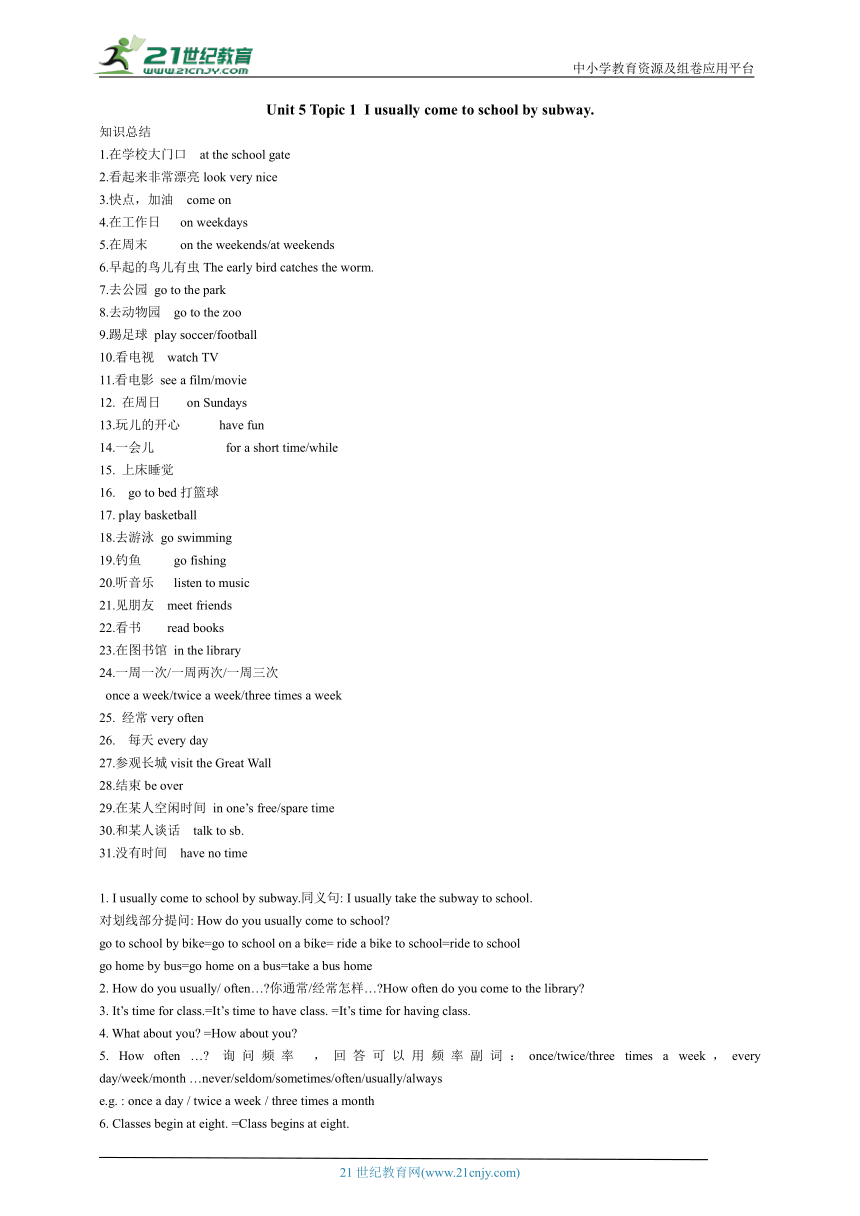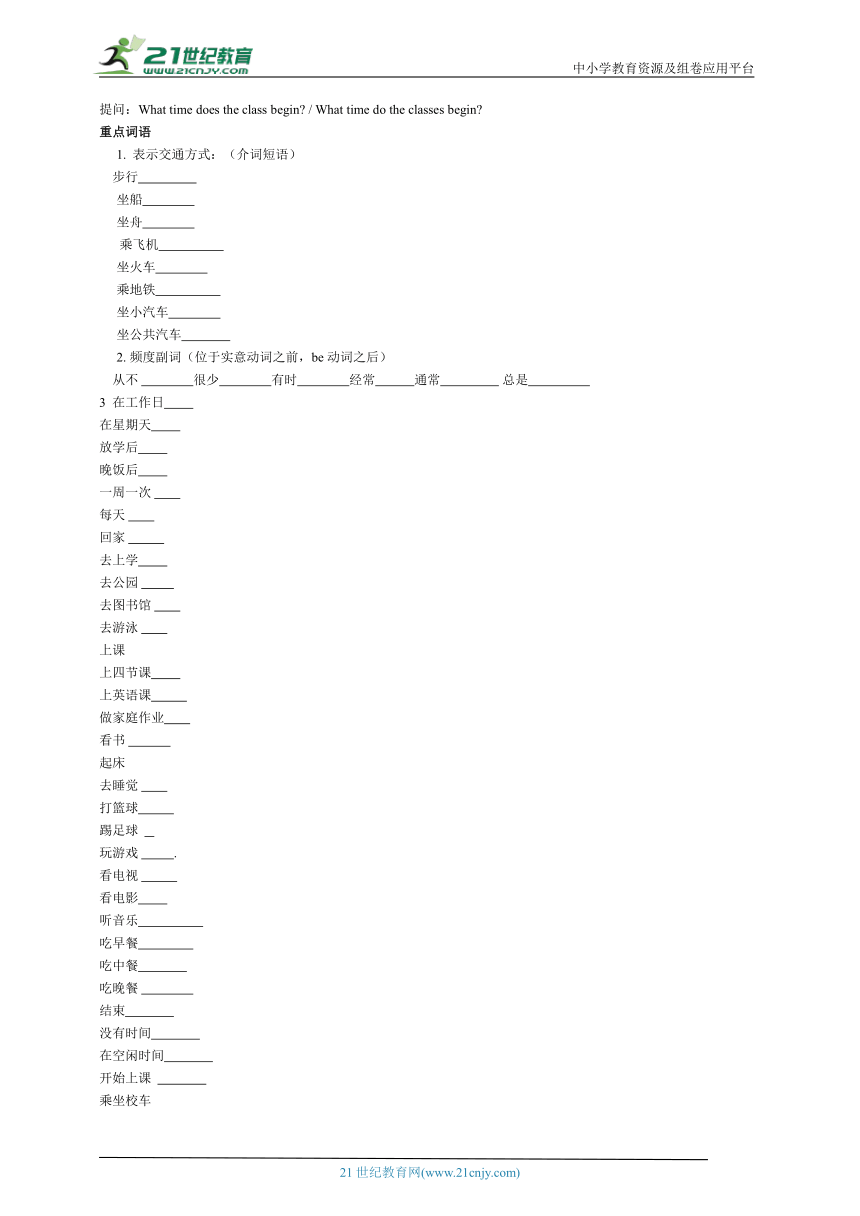Unit5 Topic 1 I usually come to school by subway. SectionD导学案(含答案)
文档属性
| 名称 | Unit5 Topic 1 I usually come to school by subway. SectionD导学案(含答案) |

|
|
| 格式 | docx | ||
| 文件大小 | 974.5KB | ||
| 资源类型 | 试卷 | ||
| 版本资源 | 仁爱科普版 | ||
| 科目 | 英语 | ||
| 更新时间 | 2023-02-21 00:00:00 | ||
图片预览


文档简介
中小学教育资源及组卷应用平台
Unit 5 Topic 1 I usually come to school by subway.
知识总结
1.在学校大门口 at the school gate
2.看起来非常漂亮look very nice
3.快点,加油 come on
4.在工作日 on weekdays
5.在周末 on the weekends/at weekends
6.早起的鸟儿有虫The early bird catches the worm.
7.去公园 go to the park
8.去动物园 go to the zoo
9.踢足球 play soccer/football
10.看电视 watch TV
11.看电影 see a film/movie
12. 在周日 on Sundays
13.玩儿的开心 have fun
14.一会儿 for a short time/while
15. 上床睡觉
16. go to bed打篮球
17. play basketball
18.去游泳 go swimming
19.钓鱼 go fishing
20.听音乐 listen to music
21.见朋友 meet friends
22.看书 read books
23.在图书馆 in the library
24.一周一次/一周两次/一周三次
once a week/twice a week/three times a week
经常very often
每天every day
27.参观长城visit the Great Wall
28.结束be over
29.在某人空闲时间 in one’s free/spare time
30.和某人谈话 talk to sb.
31.没有时间 have no time
1. I usually come to school by subway.同义句: I usually take the subway to school.
对划线部分提问: How do you usually come to school
go to school by bike=go to school on a bike= ride a bike to school=ride to school
go home by bus=go home on a bus=take a bus home
2. How do you usually/ often… 你通常/经常怎样… How often do you come to the library
3. It’s time for class.=It’s time to have class. =It’s time for having class.
4. What about you =How about you
5. How often … 询问频率 ,回答可以用频率副词:once/twice/three times a week,every day/week/month …never/seldom/sometimes/often/usually/always
e.g. : once a day / twice a week / three times a month
6. Classes begin at eight. =Class begins at eight.
提问:What time does the class begin / What time do the classes begin
重点词语
表示交通方式:(介词短语)
步行
坐船
坐舟
乘飞机
坐火车
乘地铁
坐小汽车
坐公共汽车
2. 频度副词(位于实意动词之前,be动词之后)
从不 很少 有时 经常 通常 总是
3 在工作日
在星期天
放学后
晚饭后
一周一次
每天
回家
去上学
去公园
去图书馆
去游泳
上课
上四节课
上英语课
做家庭作业
看书
起床
去睡觉
打篮球
踢足球
玩游戏 .
看电视
看电影
听音乐
吃早餐
吃中餐
吃晚餐
结束
没有时间
在空闲时间
开始上课
乘坐校车
重点句型
1. It’s time to +动原 = It’s time for sth 该是做某事的时候
如:It’s time . = It’s time .(该是吃早饭的时候)
2. 写出交通方式的同义句
1). Maria sometimes goes home by subway.= Maria sometimes .
2). Li Xiang often comes to school by bike.= Li Xiang often .
3). We usually go to the park on foot.= We usually .
3. 一般现在时的陈述句:“某人在某地/时做某事”的英文表达法:主语+谓语动词+地点/时间+…
1). Jane usually .Jane通常在六点半起床。2). She . .她十二点在学校吃午饭。
3). She and . 她五点半回家并在七点吃晚饭。
4. 一般现在时的特殊疑问句 :谓语是实意动词的特殊疑问句:疑问词+助动词(do/does)+主语+动原+…
1. 他们通常怎样去上学?
2. 他们通常在哪里吃午饭?
3. 他们在空余时间做什么?
语法学习
复习一般现在时:经常性,习惯性的行为;现阶段常规的状态。常用的时间状语:often, always, usually, sometimes, every day等等。当主语是第一、二人称和所有复数形式时,行为动词用原形。主语是三单时,谓语动词用动词的三单形式,在词尾加-s或-es。
行为动词的一般现在时,助动词是do/don’t和does/doesn’t.
1. 区别含有be动词和实意动词的肯定句式。
I am from China.√ I come from China.√ She comes from China.√
2. 一般疑问句、否定句表达的不同方式:
1) I am from China.引申出来的一般疑问句和: from China Yes, I am. /No, I am not.
否定句: I from China.
2)I come from China.引申出来的一般疑问句和否定句:
you from China Yes, I do. /No, I don’t. 否定句:I from China.
3) She comes from China.引申出来的一般疑问句和否定句:
she from China Yes, she does. No, she doesn’t 否定句She from China.
方法:肯定句变一般疑问句:
1.谓语有be动词时,直接把be动词提前。
2. 谓语有实意动词时,在句首加助动词Do/Does。
肯定句变否定句: 1.谓语有be动词时,直接在be动词后家not。
2. 谓语有实意动词时,在实意动词前加don’t/ doesn’t
3. 主语为第三人称单数时,谓语行为动词的变化。
She (play) computer games on Sundays. He (study) English every morning.
Mary (go) to school on weekdays. My mother (have) breakfast at 6:45.
4. 用法: (1) 表示现在的状况:I (be) a teacher. You (be) a student.
(2) 表示经常的或习惯性的动作:I usually (go) to school on foot. She (play) tennis every morning.
(3) 表示主语具备的性格和能力等:He likes (sing)songs.
D答案
1.on foot, by plane, by car, by ship, by train, by bus, by boat, by subway
2.never seldom sometimes often usually always
3.on weekdays, every day, go swimming, read books, on Sundays, go home, have a class, get up, after school, go to school, have four classes ,go to sleep, after dinner, go to park, have an English class, play basketball, once a week, go to library, do homework, play soccer, play games, listen to music, in spare time, watch TV, have breakfast, be over, class begins, see a movie ,have lunch, have no time, by school bus
三,1. for breakfast, to have breakfast
2, (1)take the subway home
(2) rides a bike to school
(3) walk to the park
3.(1)gets up at half past six .
(2) has lunch at school at twelve o'clock.
(3)gets home at half past five. has dinner at Seven.
4.(1)How do they usually go to school
(2)Where do they usually have lunch
(3)What do they do in the free time
语法学习
2.(1)Are you (2)am not from(3)Does come , doesn't come
3.plays, studies, goes , has
4.(1)am are(2)goes plays (3)singing
21世纪教育网 www.21cnjy.com 精品试卷·第 2 页 (共 2 页)
21世纪教育网(www.21cnjy.com)
Unit 5 Topic 1 I usually come to school by subway.
知识总结
1.在学校大门口 at the school gate
2.看起来非常漂亮look very nice
3.快点,加油 come on
4.在工作日 on weekdays
5.在周末 on the weekends/at weekends
6.早起的鸟儿有虫The early bird catches the worm.
7.去公园 go to the park
8.去动物园 go to the zoo
9.踢足球 play soccer/football
10.看电视 watch TV
11.看电影 see a film/movie
12. 在周日 on Sundays
13.玩儿的开心 have fun
14.一会儿 for a short time/while
15. 上床睡觉
16. go to bed打篮球
17. play basketball
18.去游泳 go swimming
19.钓鱼 go fishing
20.听音乐 listen to music
21.见朋友 meet friends
22.看书 read books
23.在图书馆 in the library
24.一周一次/一周两次/一周三次
once a week/twice a week/three times a week
经常very often
每天every day
27.参观长城visit the Great Wall
28.结束be over
29.在某人空闲时间 in one’s free/spare time
30.和某人谈话 talk to sb.
31.没有时间 have no time
1. I usually come to school by subway.同义句: I usually take the subway to school.
对划线部分提问: How do you usually come to school
go to school by bike=go to school on a bike= ride a bike to school=ride to school
go home by bus=go home on a bus=take a bus home
2. How do you usually/ often… 你通常/经常怎样… How often do you come to the library
3. It’s time for class.=It’s time to have class. =It’s time for having class.
4. What about you =How about you
5. How often … 询问频率 ,回答可以用频率副词:once/twice/three times a week,every day/week/month …never/seldom/sometimes/often/usually/always
e.g. : once a day / twice a week / three times a month
6. Classes begin at eight. =Class begins at eight.
提问:What time does the class begin / What time do the classes begin
重点词语
表示交通方式:(介词短语)
步行
坐船
坐舟
乘飞机
坐火车
乘地铁
坐小汽车
坐公共汽车
2. 频度副词(位于实意动词之前,be动词之后)
从不 很少 有时 经常 通常 总是
3 在工作日
在星期天
放学后
晚饭后
一周一次
每天
回家
去上学
去公园
去图书馆
去游泳
上课
上四节课
上英语课
做家庭作业
看书
起床
去睡觉
打篮球
踢足球
玩游戏 .
看电视
看电影
听音乐
吃早餐
吃中餐
吃晚餐
结束
没有时间
在空闲时间
开始上课
乘坐校车
重点句型
1. It’s time to +动原 = It’s time for sth 该是做某事的时候
如:It’s time . = It’s time .(该是吃早饭的时候)
2. 写出交通方式的同义句
1). Maria sometimes goes home by subway.= Maria sometimes .
2). Li Xiang often comes to school by bike.= Li Xiang often .
3). We usually go to the park on foot.= We usually .
3. 一般现在时的陈述句:“某人在某地/时做某事”的英文表达法:主语+谓语动词+地点/时间+…
1). Jane usually .Jane通常在六点半起床。2). She . .她十二点在学校吃午饭。
3). She and . 她五点半回家并在七点吃晚饭。
4. 一般现在时的特殊疑问句 :谓语是实意动词的特殊疑问句:疑问词+助动词(do/does)+主语+动原+…
1. 他们通常怎样去上学?
2. 他们通常在哪里吃午饭?
3. 他们在空余时间做什么?
语法学习
复习一般现在时:经常性,习惯性的行为;现阶段常规的状态。常用的时间状语:often, always, usually, sometimes, every day等等。当主语是第一、二人称和所有复数形式时,行为动词用原形。主语是三单时,谓语动词用动词的三单形式,在词尾加-s或-es。
行为动词的一般现在时,助动词是do/don’t和does/doesn’t.
1. 区别含有be动词和实意动词的肯定句式。
I am from China.√ I come from China.√ She comes from China.√
2. 一般疑问句、否定句表达的不同方式:
1) I am from China.引申出来的一般疑问句和: from China Yes, I am. /No, I am not.
否定句: I from China.
2)I come from China.引申出来的一般疑问句和否定句:
you from China Yes, I do. /No, I don’t. 否定句:I from China.
3) She comes from China.引申出来的一般疑问句和否定句:
she from China Yes, she does. No, she doesn’t 否定句She from China.
方法:肯定句变一般疑问句:
1.谓语有be动词时,直接把be动词提前。
2. 谓语有实意动词时,在句首加助动词Do/Does。
肯定句变否定句: 1.谓语有be动词时,直接在be动词后家not。
2. 谓语有实意动词时,在实意动词前加don’t/ doesn’t
3. 主语为第三人称单数时,谓语行为动词的变化。
She (play) computer games on Sundays. He (study) English every morning.
Mary (go) to school on weekdays. My mother (have) breakfast at 6:45.
4. 用法: (1) 表示现在的状况:I (be) a teacher. You (be) a student.
(2) 表示经常的或习惯性的动作:I usually (go) to school on foot. She (play) tennis every morning.
(3) 表示主语具备的性格和能力等:He likes (sing)songs.
D答案
1.on foot, by plane, by car, by ship, by train, by bus, by boat, by subway
2.never seldom sometimes often usually always
3.on weekdays, every day, go swimming, read books, on Sundays, go home, have a class, get up, after school, go to school, have four classes ,go to sleep, after dinner, go to park, have an English class, play basketball, once a week, go to library, do homework, play soccer, play games, listen to music, in spare time, watch TV, have breakfast, be over, class begins, see a movie ,have lunch, have no time, by school bus
三,1. for breakfast, to have breakfast
2, (1)take the subway home
(2) rides a bike to school
(3) walk to the park
3.(1)gets up at half past six .
(2) has lunch at school at twelve o'clock.
(3)gets home at half past five. has dinner at Seven.
4.(1)How do they usually go to school
(2)Where do they usually have lunch
(3)What do they do in the free time
语法学习
2.(1)Are you (2)am not from(3)Does come , doesn't come
3.plays, studies, goes , has
4.(1)am are(2)goes plays (3)singing
21世纪教育网 www.21cnjy.com 精品试卷·第 2 页 (共 2 页)
21世纪教育网(www.21cnjy.com)
同课章节目录
- Unit 5 Our school life
- Topic 1 I usually come to school by subway.
- Topic 2 A few students are running around the play
- Topic 3 My school life is very interesting.
- Unit 6 Our local area
- Topic 1 Is there a computer in your study?
- Topic 2 My home is in an apartment building.
- Topic 3 Which is the way to the hospital?
- Review of Units 5-6
- Unit 7 The Birthday
- Topic 1 When is your birthday?
- Topic 2 Can you sing an English song?
- Topic 3 Everyone had a good time.
- Unit 8 The seasons and the Weathe
- Topic 1 What's the weather like in summer?
- Topic 2 The summer holidays are coming.
- Topic 3 Let’s celebrate!
- Review of Units 7-8
- 旧版资料
- Unit 5 Our School Life
- Unit 6 Our Local Area
- Unit 7 The Birthday
- Unit 8 The seasons and the Weathe
- Unit 7 Celebrating the Birthday(老版本)
